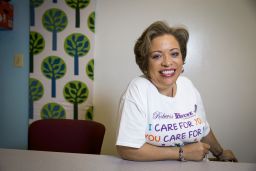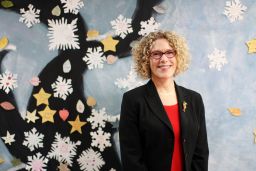The entire world is experiencing it now, in some form or another.
Grief.
With nearly half a million lives lost globally from Covid-19, many people have felt it during the last few months.
But experts say you don’t have to be mourning the death of a loved one to be experiencing the sense of anguish and loss that is grief.
“Grieving is what we do when we lose someone or something we value. It’s not just when someone dies,” said Mary Robinson, founder of Imagine: A Center for Coping with Loss in New Jersey. “Everybody’s grieving now, because we’ve all lost many things during this time.”
“People have lost their routines, their freedom to move about their communities, jobs and just being able to connect to family and friends,” said Annette March-Grier, founder of Roberta’s House, a bereavement center in Baltimore, Maryland. “Covid-19 has created what we call communal loss. It is a collective grief experience by everyone.”

For decades, March-Grier and Robinson have provided free support that’s helped thousands of families process the death of a loved one. Both were previously honored as CNN Heroes.
When the pandemic hit the US, they realized that their expertise was needed as their communities were overwhelmed by grief and loss.

In addition to moving their regular services online, both have now expanded their work. March-Grier’s neighborhood was hit hard by the virus, so she’s forming a new online group specifically for those who’ve lost someone to the pandemic.
Robinson now offers virtual meetings for healthcare workers and first responders on the frontlines. Both non-profits are also using social media to educate the public about ways to cope.
Their most important message: It’s OK to feel upset.
“There’s a pandemic of grief right now. And it’s so important that we, as human beings, recognize that and give ourselves permission to grieve,” Robinson said.
Amid this atmosphere of unprecedented loss, the traumatic death of George Floyd also provoked a huge global reaction.
“(This) created an explosion … This is now grief on top of grief,” said March-Grier, who believes that people are not only mourning the loss of Floyd’s life, but the loss of justice his death represents.
“That one man represents every mother’s son … every husband, brother in America,” she said. “(This) gave people reason to act out on that anger that they had been suppressing. … 100% it is tied to unresolved grief.”
In response, March-Grier and her team have been offering healing workshops to their community. Since emotions are running high during this difficult time, she and Robinson want people to know there are steps they can take to manage their feelings in a healthy way and feel better.
“The most important thing you can do is really talk,” Robinson said. “If you have a best friend or a therapist … you need to process all your feelings and get them out. Otherwise, they just stay inside and can cause physical harm, emotional harm.”
“The way that we can all deal with grief constructively is to do something positive – to take action and protest, peacefully. Reaching out to help someone in need,” March-Grier said. “Make positive meaning so that you can grow through this.”
CNN’s Kathleen Toner spoke with Robinson and March-Grier about their work during this time. Below is an edited version of their conversations.
CNN: You’ve said it’s helpful to find meaning in grief and loss.
Mary Robinson: For me, working in the field of grief support was my way of making meaning out of the loss of my dad. One good thing that’s coming out of this current crisis is that we’re now having a global conversation on grief and loss. We’re all discovering, “We as human beings, we grieve all loss.” And we’re naming that experience. Once you have a name for it, then you can do something about it.
Annette March-Grier: Many people who are dealing with grief don’t realize that we have a choice. For instance, if you have two individuals who experience the tragic murder of a loved one. One may decide to become angry, retaliate and go down that destructive, dark path. The other may decide that this person’s life meant something greater and “I’m going to do something to make sure this life isn’t in vain.” That latter one has a healthier perspective and will live a productive, successful life. So now, even though George Floyd’s life was taken, we can make meaning out of this by changing laws and by changing the culture of society. That’s how we cope and move forward.
CNN: How have the restrictions during the pandemic affected the way people grieve for those who’ve died?
March-Grier: People aren’t allowed to grieve and mourn in the way that is custom. They can’t attend the funerals; they can’t have a repast or family gathering after the service. They can’t follow their normal traditions, of being surrounded by family and friends. It’s heartbreaking.
Robinson: One of the things we suggest is that people become creative. Do an online memorial service and do a ritual together. Maybe light a candle, read the favorite poem or sing the favorite music of the person who died. It’s really important to mark those passages of life and to mourn together, so we have to find ways to do that virtually.
CNN: Any more advice to help people right now?
Robinson: The three most important things that we can do to take care of ourselves are, first: talking and expressing your feelings. Secondly: exercise – walking, riding your bike, shooting hoops. Getting physical is so important because it discharges the kinetic energy in your body that accompanies difficult emotions. And the last is practicing mindfulness: Take some deep breaths, do some meditation.
The other really good thing to know is if you’re feeling sad today, or depressed, it’s going to pass. Grief is like the weather – it comes and it goes and we have no control over it.
March-Grier: Try to take care of all three parts of yourself – mentally, physically, and spiritually. Try each day to feed yourself some positive inspiration or wisdom. Eat regularly and healthy. Cuddle with your pets, especially if you feel alone. Continue your religious practices. Try to keep your routines as normal as possible. And reach out to family and friends. Don’t allow yourself to be isolated during this time.
Our motto is: “I care for you, you care for me, and we care for each other.” As humans, it’s so important that we connect to one another. Whenever we’re going through a crisis, we’re not meant to go through it alone.









